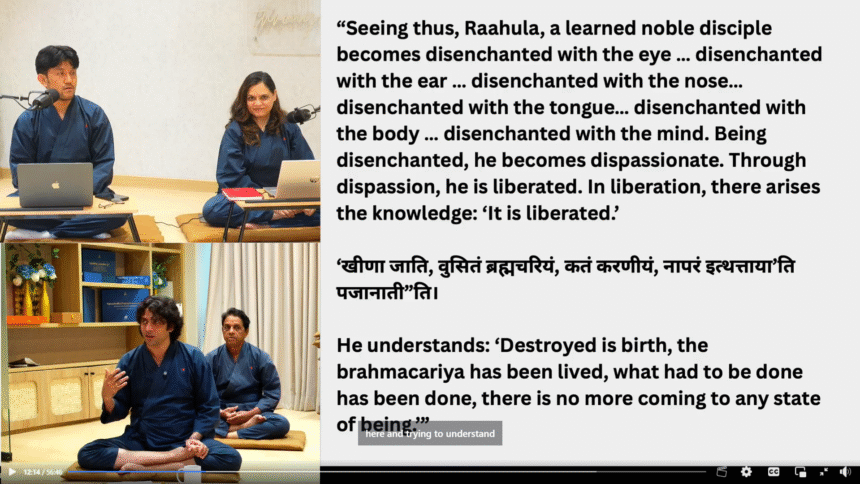Date: June 7, 2025
In a compelling live session held on June 7th, Dr. Rajesh Savera guided participants through two powerful teachings from the PaliTipitaka, the earliest and most revered collection of the Buddha’s discourses. Taken from Samyutta Nikaya 18.1 and 19.12, these two passages present a striking contrast—revealing the power of intention and the inevitable unfolding of karma.
Samyutta Nikaya 18.1 – Rāhula’s Sincere Request
At Jetavana Monastery, the young monk Rāhula, son of the Buddha, approached him with humility and purpose. After respectfully bowing, Rāhula requested a brief teaching of the Dhamma so he could practice it with energy, diligence, and determination.
This moment reflects Rāhula’s eagerness to learn, his sincere commitment to the path, and the kind of attitude that supports growth, clarity, and liberation. His approach was rooted in humility, mindfulness, and the desire to transform.
Samyutta Nikaya 19.12 – The Karmic Consequence of Malice
In contrast, the Buddha recounts a vision from Gijjhakūṭa Mountain where he sees a being submerged in filth, consuming excrement. This being, he explains, was once a Brahmin who mocked the Sangha by offering excrement instead of food—a deliberate act of disrespect.
The result? A karmic rebirth shaped not just by action, but by the intention behind it. The Brahmin’s cruelty and contempt led to deep suffering, illustrating how karma reflects the quality of the mind behind each action—not just the action itself.
Two Paths We Face
These two stories—Rāhula’s and the Brahmin’s—represent two distinct life directions:
- The path of sincerity, mindfulness, and inner growth, as embodied by Rāhula.
- The path of arrogance, harm, and careless intention, shown by the Brahmin’s fate.
Buddhism teaches that our lives are shaped by our intentions. Even when unseen by others, our inner state leaves an imprint—and karma does not miss a thing.

Daily Reflection: What Are We Cultivating?
Each moment, we plant seeds through our thoughts, words, and actions. Are we nurturing awareness, kindness, and truth? Or sowing indifference, judgment, and harm?
As Dr. Rajesh Savera emphasized, it’s not about perfection—but about being honest with ourselves. Like Rāhula, we can turn to the Dhamma with sincerity at any point in life. And like the Brahmin, we can also slip into harm through careless intention.
The Buddha’s teachings remain clear, grounded, and deeply relevant—reminding us that the mind is the field, intention is the seed, and our future is the harvest.
Conclusion
Samyutta Nikaya 18.1 and 19.12 present a powerful mirror to our daily lives. One story inspires us to rise with discipline and humility; the other warns us of the slow consequences of cruelty and disregard. Both invite us to choose mindfully, live intentionally, and walk the path of clarity and responsibility.
Please Watch this video for more Information
https://www.facebook.com/drsavera/videos/1773787840225982





